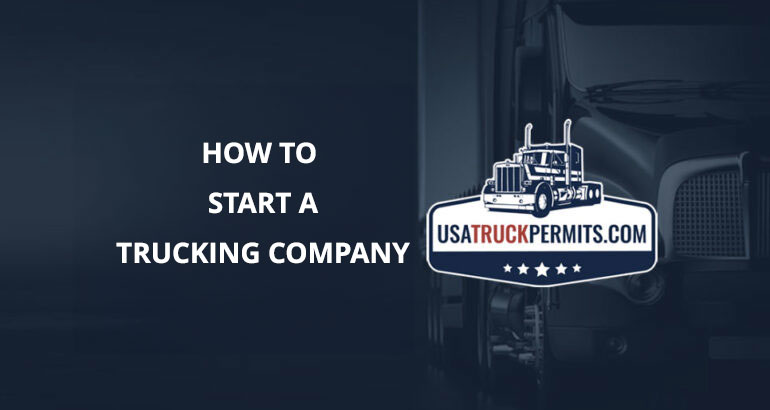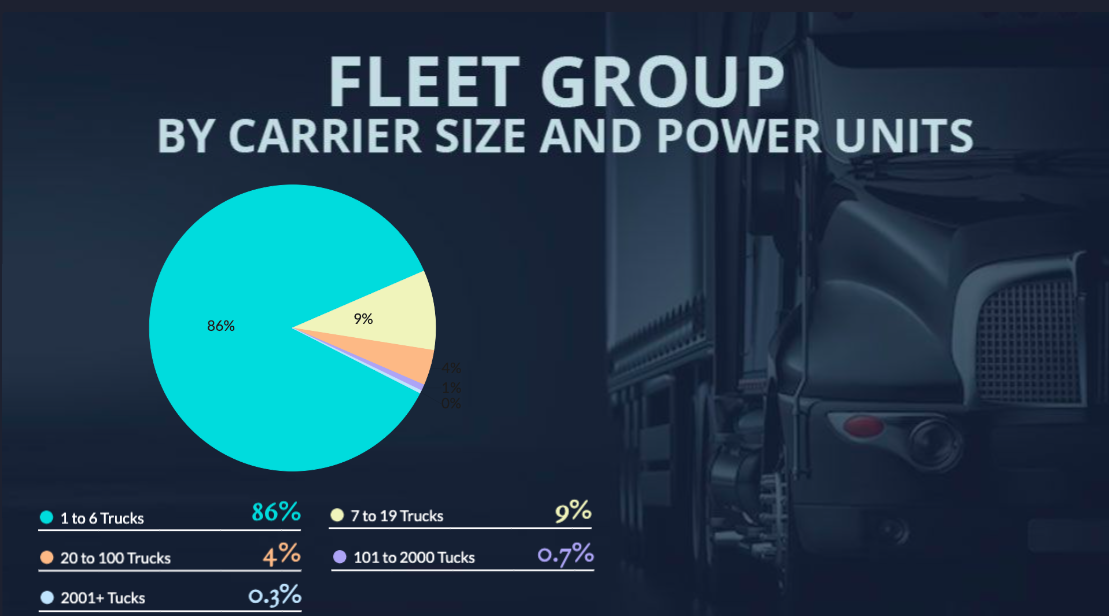
If you’ve ever dreamed of owning your own trucking company, you’re not alone. Thousands of people and owner-operators go on to start their own trucking companies every year.
Starting a trucking company as an owner-operator is a great way to have the freedom to make their own decisions, as well as the flexibility to choose their own routes and schedules. With the right planning and preparation, you can start your own trucking business and be your own boss!

Data Source: OOIDA
Starting a trucking company can be a profitable business venture if you have a solid plan and the right guidance. A common misconception is that you need to have multiple trucks to start a successful trucking company. This is not true, most trucking companies are composed of 1 to 6 trucks only! There are almost 5 times as many 1-6 truck companies as there are in other fleet-size segments combined. As long as you have 1 truck, anyone can start a trucking company and be successful! This step-by-step guide will walk you through the process of starting your own trucking company, making it easy for anyone to understand.
Step 1: Pick A Business Name and Decide Your Business Plan
The first step in starting any business, including a trucking company, is to create a comprehensive business plan. This plan should outline your business goals, target market, competition, pricing, and marketing strategy. Some key questions to ask yourself are:
- What type of truck and trailer types will we be operating?
- Do you want to go over the road or do we want to be local?
- How do we find loads?
- How many trucks do we want to start with?
Your business name is your trucking company’s brand. Whether you plan on staying an owner-operator or growing your company to multiple trucks, it’s important to have a good name that captures what you do and gives your company a professional look. You can try to include the word Delivery, Transport, Logistics, Trucking, Carriers, or Hauling in your company name. You also need to decide if you want to be a sole proprietor, a corporation, or a limited liability company (LLC).
Step 2: Obtain Necessary Licenses and Permits
To operate a trucking company, you’ll need to obtain several licenses and permits. If you are an owner-operator, you need a commercial driver’s license (CDL). It is recommended that new CDL holders have two years of driving experience before getting their trucking authority. You will then need to obtain your trucking authority and other permits. Some of the permits you would need are as follows:
USDOT number:
A USDOT number is an identification number issued by the Federal Motor Carrier Safety Administration (FMCSA) If your company operates commercial vehicles transporting passengers or hauls cargo interstate or intrastate, then you must have a USDOT number. We can help you determine if you need one.
Motor Carrier(MC) Number:
Depending on if you go intrastate or interstate, you may need an operating authority (MC Number) in addition to your DOT number.
If your company does the following, you need an MC number:
- Operate as a for-hire carrier
- Transport passengers or arrange for their transport in interstate
- Transport federally regulated commodities or arrange for their transport in interstate
There are also different types of MC authorities such as MC, Freight Broker Authority, FF, or MX number
Other Permits:
You will also need to obtain other permits such as UCR filling, BOC-3, and state-specific trucking permits, make sure that you’ve paid your HVUT(2290) Tax, enroll in your drug consortium, and more. You can contact us and we can tailor a trucking authority package with the exact permits you need!
Step 3: Purchase or Lease Trucks and Equipment
Next, you’ll need to acquire trucks, trailers, and other necessary equipment. You can decide if you want to buy or lease your trucks and trailers. Buying a truck outright can be beneficial since you now own that asset but you are 100% responsible for all maintenance, repairs, and taxes. Leasing a truck and/or trailer can have a much higher monthly payment but many leasing companies cover the costs of taxes, maintenance, and repairs. You can also get new equipment and get an option to buy it outright at the end of the leasing term.
You will also need:
- Electronic Logging Device (ELD)
- Truck stickers to put your company name, DOT number, and more on your truck
- Safety Equipment (Fire Extinguisher)
- Accessorials (truck chains, Truck tarps, straps, etc)
Step 4: Secure Insurance
Trucking companies are federally required to have trucking insurance to protect themselves and others. The FMCSA minimum requirement is $750k liability insurance but it’s recommended to have $1 million to easily get loads. It is also recommended to have cargo insurance at $100k coverage. Your insurance agent can help determine if you need additional coverage too. You will be required to pay a down payment on insurance which typically ranges from $1,500.00 to $4,000.00 per truck.
Step 5: Plan How You Will Get Customers
There are multiple ways to get customers to haul for in the trucking business. You can cold call companies who may need your services, search online for posted loads, or use your known connections to find loads and even secure contracts.
Cold Call Shipper and Freight Brokers
You can research local shippers who may need you to haul their loads. You will want to research companies that will most likely have the types of loads you’re looking for. For example, if you’re a flatbed carrier then you would look for manufacturers and companies that would need heavy machinery. If you’re a reefer carrier, you would look for grocers or companies that make food products and drinks.
You can also look for freight brokers. Here’s a list of the top 100 freight brokers that you can try cold calling and get onboarded with them.
Look For Loads on Load Boards
There are several online load boards to help finding loads easier. Load boards are websites where brokers and shippers post the loads that they need to move. Trucking companies then see these loads and call to book them. You would then negotiate the rate, send the required paperwork to haul the load, and haul the load! There are thousands of loads posted every day on these sites and once you get the hang of booking and negotiating, it’s a breeze!
Use Your Known Connections
If you were a driver before, you may have built connections. You may also have friends and family that work in companies that can help get you connections. Using your network and resources can come a long way in helping you start your company.
Dispatch Service / Dispatcher
Dispatch services are hired dispatchers for trucking companies. They use their connections and look online to find loads for you. They plan who picks up what cargo and where it goes. They also find the best routes for drivers and keep track of shipments. Plus, they talk to customers and handle paperwork. They help keep everything running smoothly. They also help bill the loads to the brokers and shippers. Dispatchers can be very helpful for owner operators that don’t have time to look for their own loads or trucking company owners who need help keeping their trucks loaded.
You should also consider creating a website, using social media, and creating a company email address using your domain name to give your company a more professional look.
Related Article: A Guide to Securing Your First Loads as a New Trucking Authority
Step 6: How Will You Get Paid
Cash flow can make or break a trucking company. In the trucking industry, NET30 is standard for most shippers and freight brokers and invoices are mostly paid by check in the mail. This is because freight brokers and shippers need time to get paid by their customers before they pay you.
Luckily, there is a solution. Freight Factoring gets you paid for your loads right away instead of waiting weeks and months to get paid. Factoring is used by the smallest owner-operator trucking companies to large fleets with hundreds of trucks. With our partnered trucking factoring company, enjoy benefits such as same-day pay, fuel advances, and the best customer service in the industry.
How long does it take to get a trucking authority?
Getting all your trucking permits can take a minimum of 2 days to 30 days depending on which permits you are required to get. If you are only running intrastate, then you only need a USDOT number which takes us 1-2 days to obtain. Obtaining your MC number at minimum takes 21 days due to the FMCSA mandatory vetting period. Most permits are quickly filed by us but some require you to have your truck or insurance for us to complete it. We can help you determine exactly how long it will take once we determine your operations type and home state.
How much does getting my trucking authority cost?
The cost of obtaining your trucking authority and your permits vary depending on your home state and operations type. It can be as low as $125 and can add up to $1400+ as you need different state permits and registration requirements. You can contact us and we can put together a package so you’re not spending more than you need to on the wrong permits.
Other expenses are:
- State IRP/Apportioned registration ranges from $500-$3,000 per truck depending on your state.
- Truck and trailer costs: Owner-operator startup costs are less since they have the truck already
- Insurance down payment which ranges from $1,500-$4,000 per truck depending on several factors
After these steps are completed, you’ll be then required to pass a New Entrant Safety Audit.
After your trucking authority goes active, your company is enrolled in the FMCSA’s New Entrant Safety Assurance Program. Within your first 18 months in business, you will be required to complete a “New Entrant” audit to ensure you’re compliant with federal trucking regulations. It’s essential to keep good records right away.
With USA Truck Permit’s My Trucking Manager program, you can maintain your important documents in our portal and we can renew your essential permits and filings. Ensuring a smooth pass on your new entrant safety audit and future audits!
You can store:
- Driver and Truck Safety Records
- Driver Qualification Files (DQF)
- Driver E-LOGS/Hours of Service (HOS) records
- Accident Records
- Accident Reporting
- Maintenance Records
- Drug and Alcohol Testing Program Records and Reports
We maintain and renew the following permits so you don’t have to worry about being fined!
- USDOT and MCS-150 updates
- Quarterly IFTA Tax Report
- IFTA License Renewal
- UCR Renewal
- Yearly 2290 Truck Tax
- State-Specific Permit Renewals
Are you ready to take the next step?
USA Truck Permits can help you get your trucking authority without the confusion and hassle of doing it yourself. We have years of experience and have helped 100’s of trucking companies start up and be successful. If you still have more questions, check out our FAQ page.
If you’re an investor or you want to start a trucking company as an owner-operator, you can contact us at (832) 787-2111 or fill out our online form!